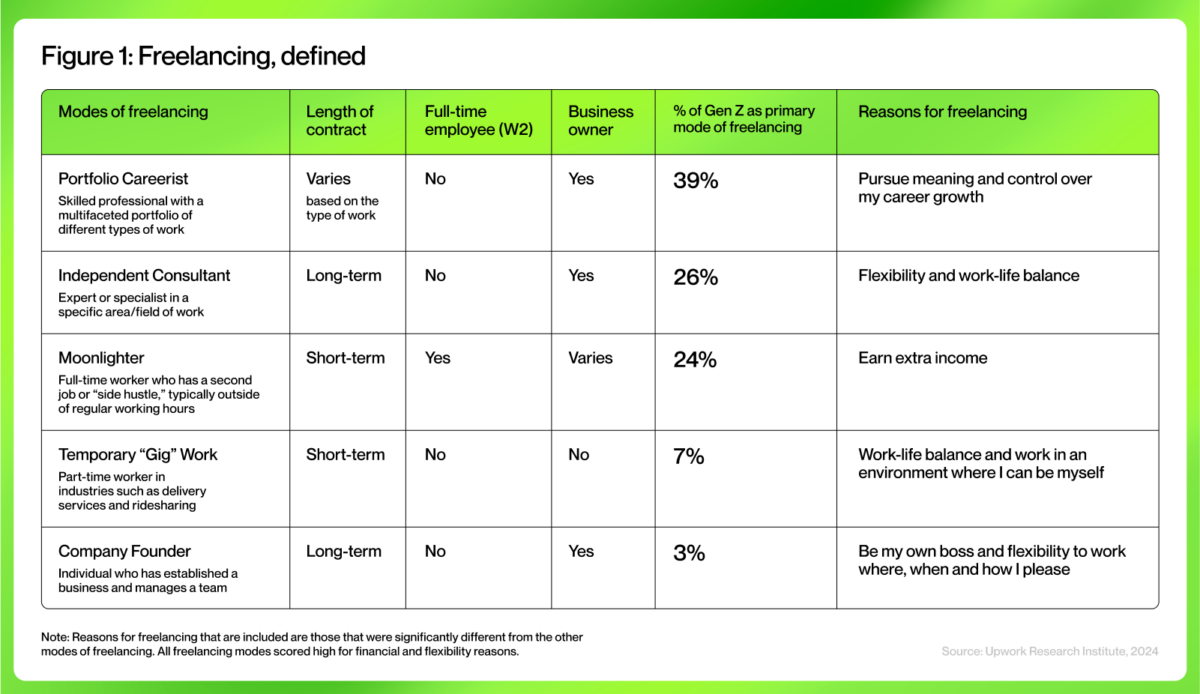- More than half (52%) of all Gen Z professionals surveyed freelanced in 2023, according to research from jobs-platform Upwork.
- Independent work puts flexibility first and relies on tech tools like AI to replace functions traditionally housed inside companies.
- But there are two sides to it: While some freelancers flourish with work they enjoy and a schedule they prefer, others get left behind.
Frustrated, she began taking on freelance projects in her field of graphic design. Over the pandemic years, she stitched together project-based work into a company for which she is the only full-time employee: Retrospective Media.
“The jobs out there that I could apply to do not offer the same security or the same job benefits that my parents and grandparents had,” Ctvrtlik said.
She represents a major cultural shift in overlapping terms between entrepreneurship, self-employed, freelancing and gig-work. Women, especially younger women and Black and Hispanic women, have largely driven a business incorporation boom since 2021 — many choosing flexibility over income.
More than half (52%) of all Gen Z professionals (roughly those born after 1996) surveyed freelanced in 2023, according to research from jobs-platform Upwork, compared to 44% of millennials, 30% of Gen X and 26% of Boomers. This is good news for Upwork, which matches freelancers with employers, enough that their team introduced me to Ctvrtlik, a prized success story of their platform.
Nearly 40% of Americans performed freelance work in 2023, up nearly 10% from 2021, to power a $1.3 trillion freelancer economy. Upwork CEO Hayden Brown has predicted that a majority of the country’s workforce will be freelancing by 2027.
“Gen Z is absolutely at the forefront of this massive shift of choosing freelancing, or a different type of independent entrepreneurial approach to work, compared to this traditional 9-to-5 employment,” said Tony Buffum, vice president of HR client strategy at Upwork.
Is that good?
The topic’s complexity is tied to overlapping terms: Ctvrtlik’s growing portfolio of work she likes and a schedule that she prefers sounds like human flourishing, but in many government data sources, she doesn’t appear all that different from a full-time ride-sharing driver living in poverty.
As part of our Thriving reporting series last year, Technical.ly wanted to better understand how many people were piecing together freelance jobs to focus on passions — being independent by choice. To approximate this, Technical.ly analyzed the 2016 to 2020 5-year American Community Survey dataset to produce a “gig-working creatives” category. It was defined as those who had two or more contract employers, at least one of which was in one of 30 occupation codes including dance, photography and visual art.
Perhaps unsurprisingly, creative capital Los Angeles had the largest population share of 20 US cities we compared. Austin, Seattle and Minneapolis were the only other cities in which more than 1% of their population fit the bill. By one estimate, these gig-working creatives were disproportionately young when compared to other segments of independent workers.
Upwork’s research team has made its distinction between those choosing gig work and others responding to short-term needs.
In a report this spring, the company outlined five “freelance career types”: portfolio careerists, independent consultants and company founders are making long-term decisions, while moonlighters and gig workers frequently do not. Nearly two in five Gen Z members surveyed fit, like Ctvrlik, into that “portfolio careerists” category, which Upwork described as “skilled professionals who manage a multifaceted portfolio of different types of work across various clients, industries and projects.”

Upwork's breakdown of five categories of freelancers. (Courtesy)
Each category can tell a different story. At least 10% of American adults, or 16 million people, are fully self-employed. Just a quarter of them have any employees, which has traditionally been a reliable indicator of wealth generation. Informal work complicates the picture further: According to a 2014 Federal Reserve Bank paper, 26% of Americans identified as not in the labor force were working “off the books,” which referred to everything from selling food to neighbors to operating cash businesses.
Put it all together, and the average self-employed American earns less than her traditionally employed peer, with fewer worker protections. Still, Ctvrtlik, like millions of Americans, has increasingly put flexibility above all else, relying on an array of web and software tools, automations and services that replace functions traditionally housed inside companies.
This complicates the hiring landscape for hiring managers too, noted Upwork’s Buffum, since a growing share of workers prefer project-based and skills-focused work arrangements. Employers are now competing with entrepreneurship, too.
"Technology is what has enabled this frictionless work experience where you can engage with a company as a contractor, do a short project, get paid, develop a new skill, and then immediately deploy that skill and get paid for it," Buffum said. Upwork’s data shows that half of Gen Z professionals are regularly using generative AI, with freelancers adopting it even faster at 61%.
These and other technologies and tools make Retrospective Media far more productive than what a single independent designer could do in the past, Ctvrtlik said. That’s why she advises others like her to think less like an individual and more like a company owner.
"If you want to do this full-time and you want this to be a viable career path,” Ctvrtlik said, “you are running a business and you have to treat it as such.”
(Watch below the un-edited interview with Ctvrtlik and Buffum)
Before you go...
Please consider supporting Technical.ly to keep our independent journalism strong. Unlike most business-focused media outlets, we don’t have a paywall. Instead, we count on your personal and organizational support.
Join our growing Slack community
Join 5,000 tech professionals and entrepreneurs in our community Slack today!

The person charged in the UnitedHealthcare CEO shooting had a ton of tech connections

From rejection to innovation: How I built a tool to beat AI hiring algorithms at their own game

The looming TikTok ban doesn’t strike financial fear into the hearts of creators — it’s community they’re worried about



